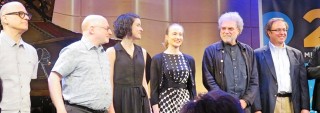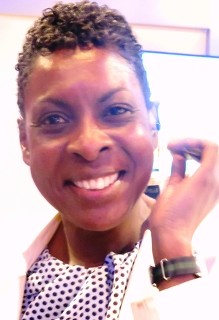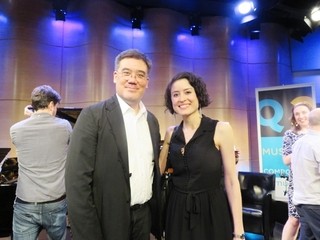|
Back
Emotions Perpetuel New York
The Greene Space at WQXR, 44 Charlotte Street
05/25/2016 -
Charles Ives: Selections from 114 Songs: Disclosure – Mists – West London – The World’s Wanderers – Memories
Christopher Theofanidis: Kaoru
Aaron Jay Kernis: Toward the Setting Sun (Vers le soleil couchant) (World premiere)
Hannah Lash: Leaves, Space (New York premiere)
David Lang: where you go (New York premiere)
Martin Bresnick: And I Always Thought (New York premiere)
Hilary Purrington: For your judicious and pious consideration (World premiere)
Yale School of Music’s New Music New Haven: Jessica Pray (Soprano), Adele Grabowski (Mezzo-soprano), Andrew Robson, Felice Doynov (Flutes), David Shifrin (Clarinet), Ani Kavafian (Violin), Lisa Clancy (Viola), Douglas Dickson, Robert Blocker, (Piano, Dean, Yale School of Music), Lisa Moore, Yevgeny Yontov (Pianos), Hannah Lash (Harp), Samuel Suggs (Double-bass), Yale Choral Artists, Jeffrey Douma (Conductor), Helga Davis (Host/Interlocutor)

D. Lang, A.J. Kernis, H. Purrington, H. Lash, M. Bresnick
C. Theofanidis (© Samuel A. Dog)
“Charley brought to his music everything he was. As well as everything he loved.”
Yale composer Martin Bresnick on Charles Ives
In the Yale School of Music, they still refer to their famed alumnus as “Charley”, 62 years after his death. And the artists from the school, who composed and performed for the NY Phil Biennial, seemed to have that same allegiance to the Ives empiric creative life. The musical languages of the seven composers varied widely. But their music made the greatest effort to communicate. Sometimes for the sake of sound, sometimes for ideological intensity.
As Alan Gilbert attendee might have affirmed, the difference between the JACK Quartet concert and the Yale School last night was fundamental. Two of those three Opening Night composers reflected Pierre Boulez, inventing musical rules which preceded the compositions. And, like Boulez, their gaming plan was to break those rules. With the Yale School of Music, the seven composers, including Charles Ives, were writing real music.
Yes, they made and broke rules, they changed performers, they might still be re-tooling their music after these premieres. But they fundamental goal was to make contact, that, even when the language was opaque, they made efforts to break through to their public.

H. Davis (© Samuel A. Dog)
This was achieved by more than the music. WQXR luminary Helga Davis interviewed six of the seven composers (Charley Ives, alas, was Entering Heaven With William Booth), giving away some secrets. David Lang, said he was less interested in choral work as in text. (He also confessed that he himself sung not well but loudly). Martin Bresnick condemned “the celebration of warfare”, thus basing his work on that most military pacifist, Bertolt Brecht.
And each of them would have been thrilled to follow Charles Ives, five of whose songs were given excellent vocal/piano treatment by student Jessica Pray and faculty member Douglas Dickson. Ms. Pray’s soprano was as dramatic as needed (and really funny during the monologue Very Pleasant Memory), though self-conscious, hardly spontaneous in her movements.
But after these songs, one wondered–with some despair–why vocal recitals here rarely, rarely include Ives. The music is as beautiful, lively, inventive (and even whistleable!) as Schubert or Gershwin. And hardly possesses that choleric effect it must have had a century ago.
The six other composers showed their technical chops, and in two cases, were almost viscerally intensive. The penultimate offering, by Martin Bresnick was an instrumental “trope” on two poems by Bertolt Brecht. His poetry was so hard, so aggressive, so blunt, one can only despair that America’s equivalents of Brecht are late-night comics.
His And I Always Thought began with mournful, almost Weimar-Berlinish lines by violin and poet. Picking up the tempo with clarinetist David Schifrin, one heard a few quasi-jazz riffs, but this didn’t continue for long. The tempo was upbeat, but we heard an intensity, an ardency until the end. Mr. Bresnick’s work was probably appealing on musical terms, yet the poems, unspoken, gave a burning fire.

A. Gilbert, H. Purrington (© Samuel A. Dog)
The final work was by a much younger composer, but Hilary Purrington’s For your judicious and pious consideration, based on the words of a condemned Salem witch, was equally emotive–without any reservations.
The combination of the splendid mezzo Adele Grabowski, with viola (in the mezzo range) Julia Clancy and piano Yvegeny Yontov, transcended style. So fervid were the words, so tight-wound were the accompanying lines that the work became a monodrama. Ms. Purrington, a singer herself, understands–like Ives understood–the essentiality of words, and one waits patiently for her first opera.
The other vocal work came from David Lang, who had taken a choral riff on the Book of Ruth. The eponymous heroine speaks of devotion, and Mr. Lang enlarged that, through the help of the Yale Choral Artists, with his usual, always telling starts and stops in the chorus, the words rippling over the twelve singers like winds in a wheatfield. Mr. Lang cannot (or should not) be explained.
The most interesting instrumental piece was Christopher Theofandis’s Kaoru, originally written for flutist Kaoru Hinata. But the pair of flutes here, Andrew Robson and Felice Doynov, presented a mesmerizing first movement. Their melodies were almost in tune with each other. Except that for each repetition, one of the two would float or flutter away. The composer explained it in terms which a biologist or a quantum physicist would easily describe. How, in a flock of birds, “the individual worked within the collective...a collective mind allowing for internal flexible relationships.”
Composer/harpist Hannah Lash played, with double-bass Samuel Suggs, Leaves, Space, an interplay of counterpoint and melody, and an homage to both instruments. Aaron Jay Kernis’ Toward The Setting Sun performed by pianist by Robert Blocker, showed the total command of his music, going from in impressionistic start to more challenging middle.
And while no listener could present to pay attention to all works equally, it was obvious that Yale had produced, like Mr. Theofandis’ flutes, minds which had a collective of talent, each soaring high with the most singular minds.
Harry Rolnick
|